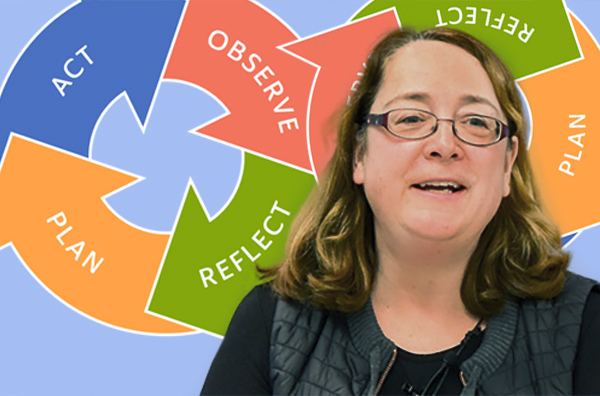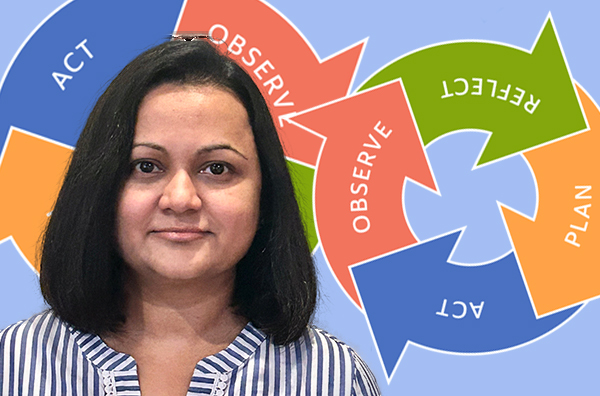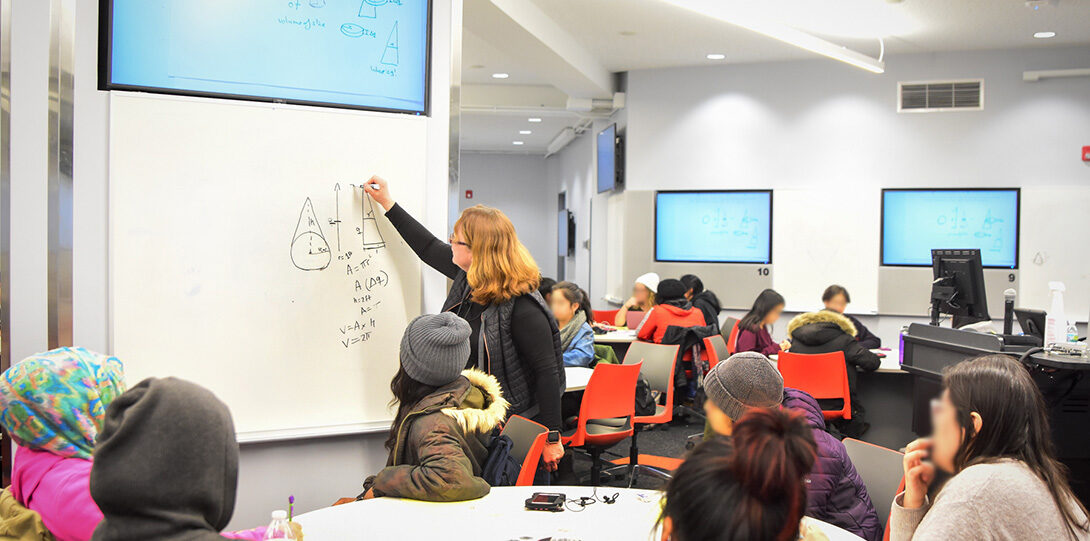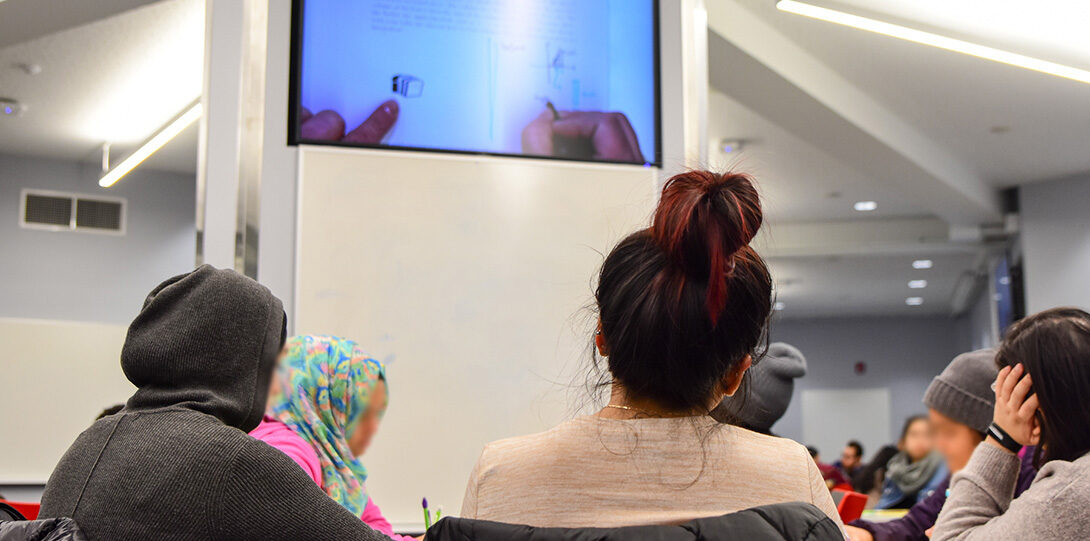Post COVID-19 Pandemic on Modality Preferences, Experiences, and Factors Contributing to Students’ Success in Mathematics Courses
Martina Bode Heading link
1
Martina Bode did her undergraduate education in Essen, Germany, and received her PhD in 1996 in mathematics at Brandeis University. She started her position at UIC in 2015 as the Director of Calculus, and became the Director of the Chicago Symposium Series, Excellence in Teaching Mathematics and Science, in 2016.
Dr. Bode’s research interests include the effectiveness of active learning methods, active learning classroom environments, and educational technology. The Learning Assistant program in Calculus courses was started by her in 2015. The program has grown to over 50 Learning Assistants in Mathematics. Martina Bode co-chaired the ITLC Educational Technology committee (2019-2021) and co-chaired the provost’s assessment committee during the pandemic (Fall 2020).
2

Martina Bode
Shavila Devi Heading link
1

Shavila Devi
2
Shavila Devi is a lecturer in the Department of Mathematics, Statistics, and Computer Science (MSCS). She has a joint PhD in Applied Mathematics and Mathematics Education. Dr. Devi’s research and teaching interests focus on collegiate mathematics education, with particular attention to minority women; student learning in algebra through calculus courses; student success; pedagogical practices of collegiate mathematics faculty; and design of learning environments that support persistence among under-represented students. In addition to teaching and research, she serves as course coordinators for two business mathematics courses – Linear Algebra for Business (Math 125) and Finite Math for Business (Math 160). She received the 2021 MSCS Faculty Teaching Award.
Abstract Heading link
Abstract
As students returned to in-person classes after the COVID-19 pandemic, understanding students’ preferences and experiences in different modes of instruction helped minimize barriers to students’ learning. This study investigates the motivation, experience, and performance of students in online and in-person mathematics courses and resources that students found helpful in achieving success. The research questions that guided this study are:
(1) What are students’ motivations for choosing online versus in-person modes of learning and instruction?
(2) In expressing a preference for one mode of instruction over another, what do students cite as most helpful in either mode?
(3) How do students rate their engagement within each mode of instruction?
2
The findings from this study are aimed at understanding students’ motivations and preferences for instruction, which could help faculty with refining their teaching. Motivations such as convenience, commute, being able to take care of family members, and keeping a job were reported as salient for choosing online learning. The analysis also shows that students reported guided in-lecture and discussion worksheets, short pre-recorded lecture videos as most helpful in achieving success in mathematics courses. Moreover, various levels of engagements were reported in different modalities, with the online students reporting a higher level of engagement. Providing different modalities of mathematics learning and teaching are important as these different modalities meet the various needs of our diverse student population.
meat Heading link
-
Project Background and Rationale
1
While online learning has been growing over the past 20 years ([1]), the COVID-19 pandemic accelerated this growth. ([2]) Nnoromele (2021) stated, “no one ever imagined the havoc an unprecedented global pandemic could wreak on the fabric of higher education institutions.” The COVID-19 pandemic pushed the education system in the United States to emergency online learning in mid-March of 2020. Remote learning lasted about two years at most colleges and universities. Educators had to develop courses to be taught either synchronously or asynchronously online in a short span of time and students had to adjust to learning online while navigating through the unprecedented challenges in the “wake of the pandemic.” Even though this crisis brought disruptions, learning loss, and was devastating in many ways, it also provided opportunities for higher education to rethink teaching and learning that is relevant and responsive to now and the future.
Since the pandemic, there has been an increased attention to providing different learning modalities: in-person instructions, fully online (synchronous or asynchronous), and hybrid (some in-person and some online components). According to the 2022 State of Student Success and Engagement in Higher Education report, students are “demanding more convenience and flexibility, and are aware of the need and value of services that support their physical and mental well-being as drivers for their academic-and lifelong-success.” While there is still preference for face-to-face learning, we wanted to explore how students responded to other modalities and build on what we learned promoted student success during the pandemic. For the purpose of this study, the definition of student success extends beyond the traditional measures of course grades and completion of degrees. It incorporates developing skills to successfully complete tasks on both micro- and macro-levels.
2
Within the context of mathematics education, student success and student identities are intertwined ([3]). Our students come to us with multiple forms of identities, such as academic, mathematics, intersectional identities (race, ethnicity, gender, language, first generation, non-traditional students, commuting students, family caregivers, low socioeconomic backgrounds, students with psychological, learning, and physical disabilities), and it has become more important now than ever to design responsive teaching and learning environments to support student learning.
To meet the diverse needs of students during the pandemic and now, we have continued to provide short pre-recorded lecture videos with captions, guided lecture sheets electronically available, incorporated student presentations during discussion sessions where students can present solutions and defend their strategies, offer online and in-person office hours, online and in-person review hours, provide online discussion forums such as Piazza, and record live lectures which are made available to students after classes for reference. These resources give students opportunities to engage with the material and learn at their own pace, while allowing us to address the key issues of diversity, equity, and inclusion.
-
Questions Investigated
The research questions that guided this study were:
(1) What are students’ motivations for choosing online versus in-person modes of learning and instruction?
(2) In expressing a preference for one mode of instruction over another, what do students cite as most helpful in either mode?
(3) How do students rate their engagement within each mode of instruction?
Definition of Course Modalities
For this study, the online hybrid modality is defined as online synchronous lectures on Monday, Wednesday, and Friday which meet on days and times listed on the schedule of classes, however, discussion sessions and exams were in-person. On the other hand, the fully in-person courses met on campus in a classroom at specified times while the fully online modality is referred to as having both lecture and discussion session meet remotely at specified times while still taking exams in person.
Course Information and Participants
For the purpose of this study, we focused on Math 125, 165, 180, and 181. Math 125, Elementary Linear Algebra, includes systems of linear equations, matrices, and vector spaces with emphasis on business application; Math 165, Calculus for Business, incorporates differential and integral calculus with emphasis on business applications; Math 180, Calculus I; and Math 181, Calculus II. All these courses are large, multi-sections, coordinated courses with about 120 students per section.
Math 125 was the only course with an online lecture component in all three survey semesters, Spring 2022, Fall 2022, and Spring 2023. On the other hand, Math 165, 180, and 181 were taught fully in-person in Fall 2022, but had one online lecture section in Spring 2023. Similarly Math 180 and 181 had one online lecture section each in Spring 2022. It is also important to note that for Calculus I and II in Spring 2023, the online lecture sections were both online synchronous and online hybrid; four discussion sessions were fully online while two were in-person. For all modalities, office hours and review sessions were offered both online and in-person.
The participants were 18-years and older who were enrolled in Math 125, 165, 180, and 181 at a public research university in the midwestern United States. The participants in Math 125 and 165 are business majors and Math 180 and 181 are on the STEM track. The University is a Minority (MSI) and Hispanic (HSI) serving institution with about 36% Hispanic students, 7% Black students, and about 21% Asian and Pacific Islander students, and 7% International Students. Our sample in Spring 2023 was made up of 36% Hispanic, 29% Asian, 24% White, and 7% Black students (see Figure 1). This is a fair representative of the undergraduate student demographics at the university. Here All courses mean all courses in this study, i.e., Math 125, 165, 180 and 181.
Survey
In this quantitative study, data was collected through Qualtrics at the end of the following semesters: Spring 2022, Fall 2022, and Spring 2023. “Qualtrics is an online survey tool which allows the user to generate surveys, distribute, collect data, and analyze results within the same platform.” The survey had 48 questions divided into seven blocks. The 7 blocks were Informed Consent (9), Motivation (5), Perception of Learning (10), Self Assessment of Math Skills (Pre/Post) (11), Barriers to Participation in Online or In Person Learning (3), Demographics (7), and Instruction Methods (3). The survey was administered to students at the end of the semester from Spring 2022 to Spring 2023. Courses with online and in-person modalities were chosen.
Math 125 was the only course that had online components from Spring 2022 to Spring 2023. In Spring 2022, the percentage of in-person students was higher (44%) than the response rate of online students (30%), whereas in Spring 2023, the trend was the opposite. Since the Fall 2020 response rate was similar for both in-person and online students in Math 125, we will use that data in Section 3.3 to study the beginning and end of the semester self-efficacy. (Note that some students did not report their modality.). In Spring 2023, 661 students responded to the survey of which 536 were enrolled in the in-person sections, and 119 in online sections, and 6 students did not report their modality.
-
Findings/Insights
Research Question 1: What are students’ motivations for choosing online versus in-person modes of learning and instruction?
Across all the online courses offered in Spring 2023, students reported being able to fit into schedule, convenience, long commute, and being able to fulfill family obligations as some of the motivations for choosing the online course. In our schedule of classes, the hybrid courses are listed as “online and on campus,” which led to 50% of students stating “being unaware” of the course modality. To resolve this issue, we have plans to follow up with students right after registration to make sure students understand the options of in-person versus online. Some of the reasons cited by students for choosing the “Other” category were “The class is at 8am and my next one is until 3 so it was convenient,” and “it happened to line up with the timing of my math classes last semester.”
Comparing the answers of ALL online students (n=117) to Math 125 online students (n=48), participants in Math 125 differed by choosing the online option because of convenience (40%), a long commute (29%), family obligations (19%), be able to keep a job (23%), and preference to learn online (17%).
For students’ motivation for choosing the in-person modes of learning and instruction across the four courses in Spring 2023, 57% of students indicated that they learn better through face-to-face instruction, 34% were unaware that a portion of the course was online, 30% reported enjoying being on campus, 19% of the participants enjoy working with others, while 16% think that online courses are more difficult than the in-person classes.
Research Question 2: In expressing a preference for one mode of instruction over another, what do students cite as most helpful in either mode?
78% of all students reported guided lecture sheets as the most helpful resource in both modalities. In addition, review sessions (both online and in-person), discussion worksheets, short pre-recorded lecture videos, learning assistants (undergraduate students who have successfully completed the course and are taking or completed a semester long training on pedagogy), and the Math and Science Learning Center were cited as beneficial. We saw a similar pattern for all the online sections.
A key difference between the two modalities is that the students in the online section valued lecture videos slightly more than the in-person students. Generally we see that the online students prefer the online resources somewhat more than the in-person students, whereas the in-person students prefer the help of the Learning Assistants and the Learning Center more than the online students.
Research Question 3: How do students rate their engagement within each mode of instruction?
To answer research question 3, we looked at students’ experience taking a math course online and the chances of them recommending the course to prospective students, and we looked at responses to active learning, student engagement, and math self-efficacy questions.
Question: Given your experience taking this math course online, would you recommend other students take this course online?
Across all the online sections, about 64% of the students would recommend taking this course online to other students. It is worth noting that about 83% of the students in Math 125 would recommend taking this course online.
The three survey questions that we looked at while investigating the role of active learning in the online courses across the four courses were:
- Self Motivation Question: In your math course, do you consider yourself a self-motivated person? (e.g., setting goals, being able to persist at challenging tasks)
- Confidence Question: My confidence in my math skills since taking this course has increased.
- Engagement Question: In the lecture (MWF) portion of this class, I am more actively involved than in traditional lecture classes.
The Likert type survey questions were assigned the following numerical values:-2 for strongly disagree, -1 for somewhat disagree, 0 for neither agree nor disagree, 1 for somewhat agree, and 2 for strongly agree.
Students in the online sections of ALL courses generally are more self motivated and report a larger confidence gain. However, they report different agreements on their level of being actively engaged compared to the traditional classroom. For example, the online students agreed that they are actively involved in their classes slightly more than the in-person students. On the other hand, the in-person students rated higher than the online students on being neutral in terms of being actively involved in online learning.
Even though positive outcomes were reported across all the online courses, the results of Math 125 online students rating their engagement were exceptional. This course is coordinated and taught by the second author. Students in the online section of Math 125 reported being more actively involved than in traditional lecture classes (mean = 0.70 and standard deviation = 1.09). They also reported being able to manage their own learning and were more likely to ask questions via chat and microphone. Based on the results, it can be concluded that designing quality courses and having skillful instructors are paramount to student success in online modalities.
For the pre-post analysis, we focused on Math 125, Fall 2022, since we had a good response rate for both in-person (31%) and online (34%) students.
Question: Do you feel that high-quality learning can take place without having face-to-face interaction?
About 94% of the participants in the online section (n=32) believed that high quality learning can take place without face-to-face interaction, while 60% in the in-person modality (n=116) believed the same (see Fig. 6). It is worth noting that this is a retrospective pre-post study where the questions were phrased as “at the beginning of the semester” and “at the end of the semester.”
One interesting finding while studying the pre-and-post survey questions on “I enjoy doing mathematics,” “I am confident in my math abilities,” and “I am able to learn mathematics,” the online students initially scored lower than the in-person students, however, at the end of the semester, they reported a higher level of math self-efficacy as they completed the hybrid modality than the in-person students.
Question: “I enjoy doing mathematics” at the beginning of the semester, at the end of the semester
Online students start with less enjoyment but end up with a large gain.
Question: “I am confident in my math abilities” at the beginning of the semester and at the end of the semester
Online students start the semester with low confidence in their math abilities, however, report a higher confidence level at the end of the semester.
Question: “I am able to learn mathematics” at the beginning of the semester and at the end of the semester
Online students start with believing less that they are able to learn math but end up with a large gain and similar beliefs at the end of the course.
-
Dissemination and Impact
- At the individual level, this study allowed us the opportunity to continue to support our diverse student population by providing different instructional modalities in several mathematics courses.
- At the department/program or college/school level: Discussions with the Associate Head of Instruction and Implementation of online lecture options for students. This also allowed faculty to draw best on their skills in teaching different modalities while meeting their teaching goals.
- At the institutional (UIC) level: We shared our results at the Center for the Advancement of Teaching Excellence (CATE), Action Research Scholars Presentation: Post Covid-19 Pandemic on Modality preferences, experiences, and factors contributing to students’ success in mathematics courses.
- At the state, national, and/or international levels:
- Conference Presentation: July 3, 2023, Post Covid-19 Pandemic on Modality preferences, experiences, and factors contributing to students’ success in mathematics courses. EduLearn 2023, Palma, Spain
- Publication: Bode, M., Devi, S. (2023). POST COVID-19 PANDEMIC ON MODALITY PREFERENCES, EXPERIENCES, AND FACTORS CONTRIBUTING TO STUDENTS’ SUCCESS IN MATHEMATICS COURSES. EDULEARN23 Proceedings (pp. 4960-4969). IATED Academy. Doi:10.21125/edulearn.2023.1305
-
Implications
As a result of implementing our action research project, we now are offering online sections in courses with positive feedback and outcomes. We also place emphasis on using course materials such as lecture worksheets across most 100 and 200 MSCS level courses. We are also part of the Action Research Scholars learning community group, and have made connections with other Action Research Scholars.
-
References
- Dalton, M.H., “Online Programs in Higher Education: Strategies for Developing Quality Courses,” FOCUS on Colleges, Universities & Schools, vol.12, no.1.
- Nnoromele, Salome C., “Reflecting on the Impact of the COVID-19 Pandemic on Higher Education,” Susan Bulkeley Butler Center for Leadership Excellence and ADVANCE Working Paper Series, vol. 4, no. 1, pp. 24-32, 2021.

